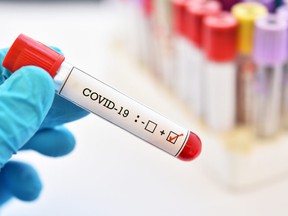Article content
The public health unit in Huron and Perth counties is preparing to scale back its COVID-19 vaccination clinics next month.

The public health unit in Huron and Perth counties is preparing to scale back its COVID-19 vaccination clinics next month.
The public health unit in Huron and Perth counties is preparing to scale back its COVID-19 vaccination clinics next month.
The region’s medical officer of health, Dr. Miriam Klassen, told reporters about the decision during a press conference Wednesday afternoon.
“We’re not seeing a lot of new people start a vaccine series,” she said.
Huron Perth public health noted a drop in demand for the jabs in January. Klassen said many factors could be contributing, but officials don’t believe access to clinics has been a problem.
“We have worked really hard with lots of wonderful partners to ensure that people have access,” she said. “There’s been a lot of outreach to ensure everybody who wants a vaccine can have one.”
Instead, Klassen suggested the region’s strong vaccination rates are more telling.
Nearly 85 per cent of Huron-Perth residents older than five have at least one dose while 81 per cent are fully vaccinated, health unit figures show.
Slightly more than 60 per cent of adults 19 and older have received a booster, including more than 93 per cent of residents 70-plus.
Among Huron-Perth youth between the ages of five and 11, the slowest demographic to become eligible for vaccinations, 48 per cent have received one dose and 28 per cent are fully vaccinated.
“Thank you, Huron-Perth, for making it a priority to get vaccinated,” Klassen said. “By doing that, you have really helped interrupt chains of transmission. You have helped to keep hospitalizations manageable. You have helped to save lives.”
Huron Perth public health has recently been organizing more clinics in the region’s smaller communities. Those efforts will continue through March, Klassen said.
Afterwards, the health unit won’t be scrapping their vaccination clinics entirely. Shots will also continue to be available through pharmacies and primary-care providers.
“We are going to continue to promote vaccination going forward, and we are going to make sure everybody is very informed if there’s a new variant … or newer vaccines,” Klassen said. “We know that this virus isn’t going away. It’s going to be with us for a while and so I continue to encourage everyone that can to be vaccinated. It’s the best way to develop immunity without risking severe outcomes from infection.”
Huron-Perth reported 15 new confirmed COVID-19 cases in high-risk settings on Wednesday. Although Ontario relaxed another chunk of public-health measures this week, Klassen said the virus is still circulating “at pretty high levels” and warned that health-care capacity still hasn’t fully recovered from the pandemic’s Omicron wave.
“Hospitals are working to ramp surgeries back up and work to clear backlogs, but there are still high staff absenteeism rates across the health-care sector,” she said. “We’re still not back to controlled transmission.”
Andrew Williams, chief executive of the Huron Perth Healthcare Alliance, confirmed Wednesday that his hospital group – which includes Stratford, St. Marys, Clinton and Seaforth – has recently been allowed to increase service levels to about 70 per cent of its pre-pandemic volume.
About 40 hospital workers were off the job Wednesday due to COVID.
“We’re being cautious,” Williams said. “We’re excited like everybody is to see the measures being eased, but we need to be responsible and continue to focus on putting safety first.”
Four people from Huron-Perth were in hospital Wednesday due to COVID-19 or a related complication.
Zero outbreaks were reported in the region Wednesday.
Across the rest of the province, Ontario reported Wednesday that 847 people were in hospital because of COVID-19, down from 1,106 a week ago.
There were 273 people in intensive care due to COVID-related illness, compared to 312 one week ago.
Twenty-seven additional COVID-19 deaths were added to the total in Ontario, including three people who died more than a month ago, bringing the total number of lives lost to 12,478.
-With files from Postmedia news and The Canadian Press

TORONTO – Health Canada has authorized Moderna’s updated COVID-19 vaccine that protects against currently circulating variants of the virus.
The mRNA vaccine, called Spikevax, has been reformulated to target the KP.2 subvariant of Omicron.
It will replace the previous version of the vaccine that was released a year ago, which targeted the XBB.1.5 subvariant of Omicron.
Health Canada recently asked provinces and territories to get rid of their older COVID-19 vaccines to ensure the most current vaccine will be used during this fall’s respiratory virus season.
Health Canada is also reviewing two other updated COVID-19 vaccines but has not yet authorized them.
They are Pfizer’s Comirnaty, which is also an mRNA vaccine, as well as Novavax’s protein-based vaccine.
This report by The Canadian Press was first published Sept. 17, 2024.
Canadian Press health coverage receives support through a partnership with the Canadian Medical Association. CP is solely responsible for this content.
The Canadian Press. All rights reserved.

VANCOUVER – Mayors and other leaders from several British Columbia communities say the provincial and federal governments need to take “immediate action” to tackle mental health and public safety issues that have reached crisis levels.
Vancouver Mayor Ken Sim says it’s become “abundantly clear” that mental health and addiction issues and public safety have caused crises that are “gripping” Vancouver, and he and other politicians, First Nations leaders and law enforcement officials are pleading for federal and provincial help.
In a letter to Prime Minister Justin Trudeau and Premier David Eby, mayors say there are “three critical fronts” that require action including “mandatory care” for people with severe mental health and addiction issues.
The letter says senior governments also need to bring in “meaningful bail reform” for repeat offenders, and the federal government must improve policing at Metro Vancouver ports to stop illicit drugs from coming in and stolen vehicles from being exported.
Sim says the “current system” has failed British Columbians, and the number of people dealing with severe mental health and addiction issues due to lack of proper care has “reached a critical point.”
Vancouver Police Chief Adam Palmer says repeat violent offenders are too often released on bail due to a “revolving door of justice,” and a new approach is needed to deal with mentally ill people who “pose a serious and immediate danger to themselves and others.”
This report by The Canadian Press was first published Sept. 16, 2024
The Canadian Press. All rights reserved.

The Canadian government says it will donate up to 200,000 vaccine doses to fight the mpox outbreak in Congo and other African countries.
It says the donated doses of Imvamune will come from Canada’s existing supply and will not affect the country’s preparedness for mpox cases in this country.
Minister of Health Mark Holland says the donation “will help to protect those in the most affected regions of Africa and will help prevent further spread of the virus.”
Dr. Madhukar Pai, Canada research chair in epidemiology and global health, says although the donation is welcome, it is a very small portion of the estimated 10 million vaccine doses needed to control the outbreak.
Vaccine donations from wealthier countries have only recently started arriving in Africa, almost a month after the World Health Organization declared the mpox outbreak a public health emergency of international concern.
A few days after the declaration in August, Global Affairs Canada announced a contribution of $1 million for mpox surveillance, diagnostic tools, research and community awareness in Africa.
On Thursday, the Africa Centres for Disease Control and Prevention said mpox is still on the rise and that testing rates are “insufficient” across the continent.
Jason Kindrachuk, Canada research chair in emerging viruses at the University of Manitoba, said donating vaccines, in addition to supporting surveillance and diagnostic tests, is “massively important.”
But Kindrachuk, who has worked on the ground in Congo during the epidemic, also said that the international response to the mpox outbreak is “better late than never (but) better never late.”
“It would have been fantastic for us globally to not be in this position by having provided doses a much, much longer time prior than when we are,” he said, noting that the outbreak of clade I mpox in Congo started in early 2023.
Clade II mpox, endemic in regions of West Africa, came to the world’s attention even earlier — in 2022 — as that strain of virus spread to other countries, including Canada.
Two doses are recommended for mpox vaccination, so the donation may only benefit 100,000 people, Pai said.
Pai questioned whether Canada is contributing enough, as the federal government hasn’t said what percentage of its mpox vaccine stockpile it is donating.
“Small donations are simply not going to help end this crisis. We need to show greater solidarity and support,” he said in an email.
“That is the biggest lesson from the COVID-19 pandemic — our collective safety is tied with that of other nations.”
This report by The Canadian Press was first published Sept. 13, 2024.
Canadian Press health coverage receives support through a partnership with the Canadian Medical Association. CP is solely responsible for this content.
The Canadian Press. All rights reserved.


World Junior Girls Golf Championship coming to Toronto-area golf course


Penguins re-sign Crosby to two-year extension that runs through 2026-27 season


Politics likely pushed Air Canada toward deal with ‘unheard of’ gains for pilots


Fernandez and Dabrowski headline Canadian lineup for Billie Jean King Cup Finals


Blinken is heading back to the Middle East, this time without fanfare or a visit to Israel


Former military leader Haydn Edmundson found not guilty of sexual assault


Donald Trump doesn’t share details about his family’s cryptocurrency venture during X launch event


Polls close for byelections in Montreal and Winnipeg